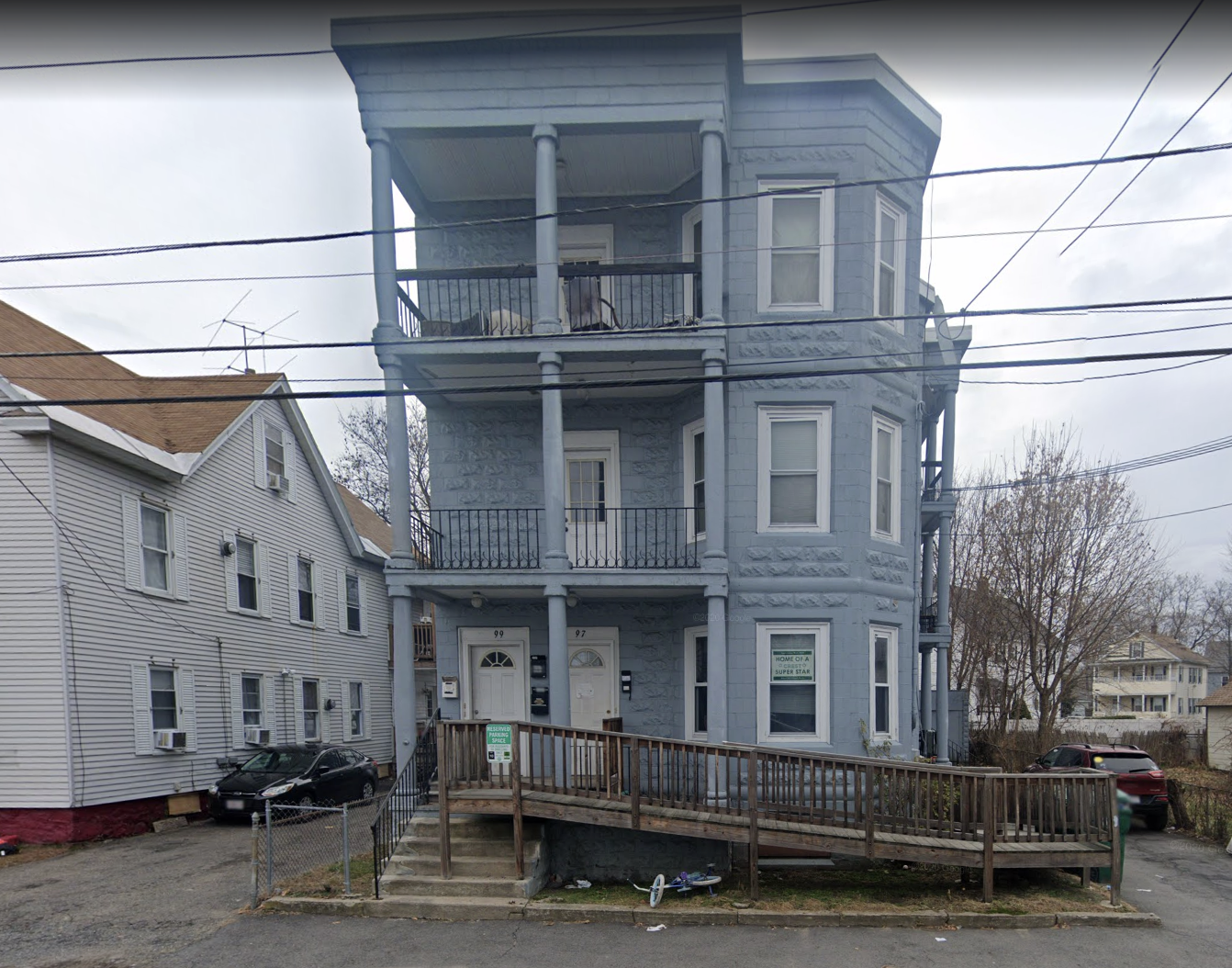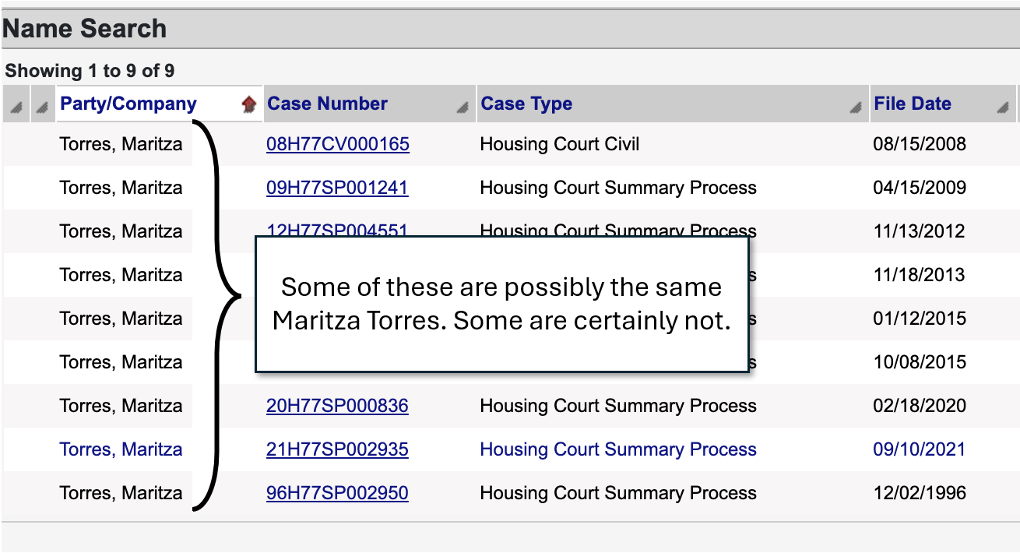Renter Appeals Own Win in Housing Court, Secures Additional Damages Under 93A
. Posted in News - 0 Comments
By Kimberly Rau, MassLandlords, Inc.
A landlord who lost her eviction case found herself back in court when her tenant appealed her own victory, stating that the court erred when it determined that the housing provider had not violated the state’s consumer protection laws. The appeals court agreed with the renter’s argument, determining that additional damages as well as attorney’s fees were in order.

The Aiken Avenue address in Lowell where tenant Maritza Torres claimed her landlord waited months to fix sanitary code violations. (Image: Google Earth)
The landlord originally filed a no-cause summary process to regain possession of the rental, even while charges of sanitary code violations were active. The summary process case centered on the renter’s counterclaims of violation of warranty of habitability and of Chapter 93A, which governs consumer protection. The first court stated the landlord had fixed the sanitary code issues in a reasonable amount of time; the tenant and the appeals court disagreed. How long is too long to wait to fix a sanitary code violation?
Board of Health; CTI Inspections Corroborate Renter’s Concerns
Maritza Torres began renting her Lowell home from Phyllis Ndoro in 2015. At the time of the lawsuit, court documents stated Torres had signed a lease and had a rent subsidy for the apartment, administered by Community Teamwork, Inc. (CTI) of Lowell.
Court records state that Torres informed Ndoro that there were problems with the bathroom’s subfloor in July 2021. After that, the Lowell Board of Health and CTI performed two inspections each at the property between October 2021 and March 2022. They issued a total of four written notices between them, each citing multiple violations of the state sanitary code.
The first notice came from the city of Lowell on Oct. 27, 2021. It cited the following code violations: broken bathroom tiles and water damaged walls around the shower; loose railings on an exterior ramp; a broken outlet in the kitchen along with a leak and damaged cabinet floor under the sink; a shower that did not “keep water,” along with a leaking shower head and a broken outlet in the bathroom; bedroom doors with keyed locks and missing doorknobs; and a broken kitchen window.
Massachusetts law requires landlords to “substantially complete” indicated repairs within 14 days. A board of health may be stricter than that, depending on municipality: Many landlords are given 24 hours of turnaround time. In this instance, Ndoro was instructed to fix the violations no later than Nov. 10, 2021. Court documents state she did not perform those repairs by the deadline.
CTI inspected the property on Nov. 24, 2021, and found the same issues the Lowell board of health had. CTI’s notice specifically detailed the damage to the bathroom floors, along with other code violations that were not specified in the prior inspection, including broken smoke and carbon monoxide detectors. Ndoro was instructed to substantially make the repairs by Dec. 11, 2021, and did not meet that deadline.
CTI returned to the property on Jan. 24, 2022, and noted that the rental again failed inspection. The notice following the visit specifically instructed Ndoro to install a new floor in the bathroom. When board of health inspectors visited again on March 29, they issued an additional notice of violation, instructing Ndoro to replace the bathroom floor within 10 days, along with other necessary repairs. The board of health also stated that Ndoro would have to pay $300 for each violation not addressed within the indicated timeframe.
Then, on April 1, 2022, CTI informed Ndoro that she would not be receiving rental subsidy payments until she completed all the required repairs. It also stated that unless she requested a re-inspection by April 15, CTI would begin the process to terminate her contract for housing assistance payments on June 1.
CTI notified Ndoro on May 27, 2022, that the apartment passed their inspection. That was seven months after the first inspection, and more than nine months after court documents state Torres reported her concerns to Ndoro.
Housing Court Awards Possession to Torres, Dismisses Most Counterclaims
While this was going on, Ndoro filed a no-cause-stated eviction in September 2021 to have Torres and her family removed from the property. At that point, Torres filed multiple counterclaims with the court, including breach of warranty of habitability, violations of Chapter 93A, breach of quiet enjoyment and retaliation.
At the bench trial, Torres waived the breach of quiet enjoyment counterclaim and did not bring it up during her appeal.
The judge found the rotting floorboards left for nine months were a danger to Torres and her children’s safety, and constituted a violation of the warranty of habitability. He awarded possession and $1,170 in damages to Torres. However, the judge in the case, Gustavo A. del Puerto, stated that Ndoro had not engaged in deceptive acts or practices (violating Chapter 93a) because the cited issues were corrected in a reasonable length of time. Torres’ other counterclaims were also dismissed.

The board of health doesn’t play around. If you are given a deadline to substantially complete repairs, you must do so, or request an extension if necessary. Lack of communication could have negative consequences. (Image: Towfiqu Barbhuiya for Unsplash)
Tenant Appeals Own Win
Torres appealed the decision, and the appeals court sided with her, reversing the original decision.
“Ndoro’s approximately nine-month delay in replacing the rotting bathroom underflooring also constituted a sufficiently substantial and material breach of the implied warranty of habitability which…established a violation of c. 93A,” wrote appeals judge Paul Hart Smyth.
The court rejected Ndoro’s claim that she did not know how serious the damage to the floor was until she got to court, noting that both agencies had specifically mentioned the subflooring in their reports.
During the appeals process, Ndoro reportedly stated that supply chain issues and labor shortages due to the Covid-19 pandemic had caused delays in completing the repairs. The court could not entertain this claim because it had not been made in the original hearing, but noted that even if it could, Ndoro would have lost.
“Ndoro’s testimony that the Covid-19 pandemic made it generally more difficult to retain contractors ‘between 2020 and early 2021’ did not address her delay in hiring a contractor to repair the condition of the bathroom floor of which she was first notified by Torres in July 2021,” the appeals court response reads.
“We note there was no evidence that Ndoro contacted the Lowell board of health to either request an extension based on contractor unavailability or to appeal from any of the above-referenced notices of code violations,” it continues.
The final blow to Ndoro’s case was the fact that the floor was repaired only when CTI threatened to cut off her housing subsidy payments, which amounted to $1,341 per month.
The appeals court sent the matter back to housing court where the damages owed Torres, including attorney’s fees, will be calculated.
Ndoro’s attorney, Thomas D. Kennedy, was quoted in a Mass. Lawyers Weekly article about the case, in which he called the term “reasonable time” subjective.
“It was our position, as evidenced by the pleadings, that the landlord repaired the defects within a reasonable amount of time,” Kennedy said in the article. “It is very difficult to define what is reasonable, especially under circumstances such as these.”

Who’s who? The Northeast Housing Court has nine entries for Maritza Torres, but most of them cannot be attributed to the defendant in this case. The courts offer us no way to differentiate between individuals, a problem for renters and landlords. (Image: masscourts.org)
Advice for Landlords: Create a Paper Trail
Waiting the better part of a year to make necessary repairs to your rental property, especially when you have been given a much tighter deadline by the board of health, is too long. Sometimes delays happen, but it’s important you handle them correctly.
In this case, landlord Ndoro claimed she had attempted to fix the rotting bathroom floor, but pandemic-related delays and shortages prevented her from accomplishing that task. The appeals court stated there was no evidence Ndoro had requested an extension based on this.
Did Ndoro attempt to repair the bathroom floor before CTI revoked the housing subsidy she received for the rental? Perhaps, but she had no proof. The appeals court would not have upheld the original court’s decision even if it could have entertained the argument because of that.
This shows the importance of documenting everything you do as a landlord. Did you call 15 plumbers before someone finally agreed to come out and fix your tenant’s leaky toilet? Make a note of the times you called. (You can also get a call log from your telephone provider if you need to.) Did a repairman cancel? Make sure you document that. Did supply chain issues make fixing the deck a longer process than anticipated? Save that email you got from Lowe’s backordering your lumber.
And, always, communicate these delays with your tenant. Think about which you would prefer from your renter if they were going to be a few days late with the rent. Would a little explanation (“My employer forgot to put in payroll, I will pay you first thing Monday.”) alleviate a lot of frustration? Probably.
Conclusion
We are not suggesting what happened in Ndoro’s rental was Torres’ fault, and neither did Ndoro. Court documents state Ndoro did not attempt to argue that Torres’ actions had caused the damage to the property. And we don’t have much evidence to suggest Torres had been a problem tenant before. We tried to search her name in the court database, but the state system is not good at differentiating between people of the same name. There were nine entries in the Northeast Housing Court for “Maritza Torres,” and none of them had any sort of identifier to tell us who was who. We had to go to public records to determine that some of them were definitely not the same person, and a couple of them could be “our” Torres – but we wouldn’t be able to swear to it.
This is why proper tenant screening is so important, especially as eviction sealing goes into practice. If you are seeing red flags with any potential tenant, check their references. The current landlord may lie to get a headache tenant to move, so check with the landlord before that if you have to.
It’s true that Massachusetts is a very tenant-friendly state, and even if Torres (the renter) had done something to ruin the subfloor in the bathroom, it would have been Ndoro’s (the landlord’s) responsibility to fix it. This is true even if you have a signed conditions statement showing that you rented out a perfectly up-to-code unit. You can always pursue reimbursement later, but you have to keep the rental livable in the meantime.
This is why it’s important to perform annual inspections on the rental, so you can catch problems early, and communicate with your tenants if there are delays on repairs. If you do end up in court, you can prove that you attempted to fix the issue at hand, and show documentation of any holdups in the process.
Renting to someone who does not have a negative rental history does not guarantee a problem-free tenancy. Even if Torres had been in court many times before (which is not necessarily what we discovered), the court determined twice that she was in the right this time. But performing lawful, proper tenant screening, and practicing effective communication should help you avoid some landlording headaches.




